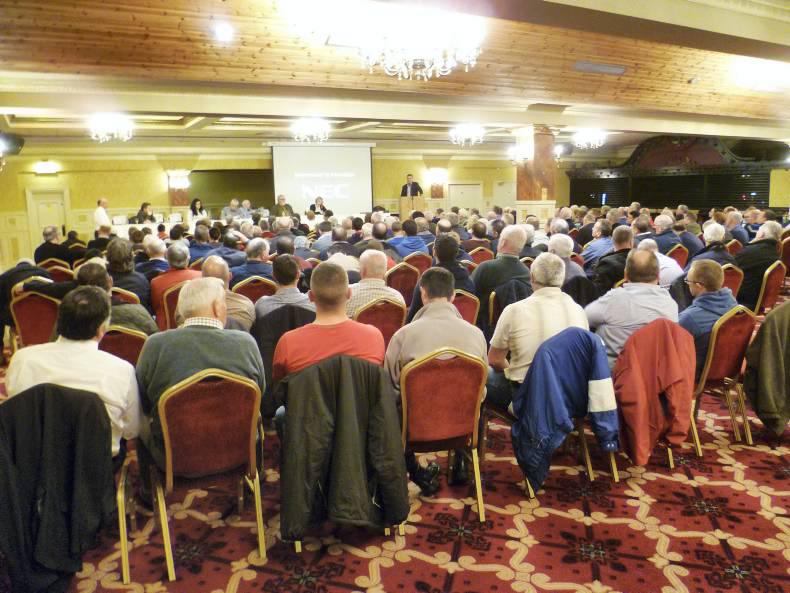A large crowd of approximately 200 farmers from across NI turned up in Cookstown on Tuesday night to the meeting organised by Farmers For Action (FFA) and the NI Agricultural Producers’ Association (NIAPA) to highlight the current crisis in local agriculture.
Invited to the meeting were representatives from the main political parties in Northern Ireland, to hear firsthand about the financial situation facing local agriculture, and also about the plans from FFA and NIAPA for legislation on farmgate prices.
Those plans which involve scrapping the CAP and putting in place a minimum cost of production for farm produce plus a margin, inflation linked, are nothing new, having been promoted by the FFA over the last number of years. However, for the first time, they seemed to have some level of support, with a show of hands indicating that the majority of the audience favoured the approach.
The response from the main political parties was generally non-committal, with no political heavyweights on the stage. Only the SDLP and Sinn Féin put up their agricultural spokespersons in the form of Joe Byrne and Oliver McMullan.
The other main parties either underestimated the situation or thought it was one best avoided. For the Ulster Unionists, mid-Ulster MLA Sandra Overend attended, with their agriculture spokespersons in the form of Robin Swann and Jo-Anne Dobson unavailable.
The Alliance party, the TUV, the Greens and the DUP failed to put forward anyone for the meeting. The rest of the panel was made up of Roger Lomas (NI Conservatives), Claire Sugden (Independent) and Alan Love (UKIP). They provided some alternative thinking, although none had much of a background in agriculture.
Aside from the issue of legislation, the politicians were left in no doubt as to the difficult situation facing farmers. There was a clear expectation from the audience that they should be doing more to help.
There was also the predictable criticism for the Going for Growth report of the Agri-Food Strategy Board. Board chair Tony O’Neill was invited to the meeting as an observer, but had the microphone thrust in his hand and was asked to defend the concept. “No one has offered an alternative to the report. We need to move forward, and improve how we all work together,” he said.
He suggested that the idea of legislation on farmgate prices is one that could not work in practice, given that NI agriculture must compete in a world market.
While the meeting in Cookstown dragged on, with some predictable rhetoric from politicians, there were some interesting points made.
Much weight was put by Sinn Féin MLA Oliver McMullan on the new supply chain forum as a way to take the industry forward. McMullan also highlighted the potential in the upcoming £250m Farm Business Investment Scheme. However, he was reminded that the farmer still had to find the other 60% of funding, and previous experience was that the price of steel and concrete goes up once a scheme opens.
His SDLP counterpart Joe Byrne was keen to get across his idea of a semi-state marketing body to promote NI food, based on a similar model to the Irish food board, Bord Bia.
He also highlighted the need for changes to be made to the current CAP when a midterm review takes place in 2017 and questioned the wisdom of NI dairy farmers who keep 10,000-litre cows fed on three tonnes of meal.
Both Byrne and McMullan strongly advocated staying as part of the EU. However, Alan Love from the UKIP put across their vision, where the UK exits and the money saved is used to continue to pay farmers a subsidy payment, but capped at £120,000 per lowland farm.
NI Conservative Roger Lomas had a slightly different take on the EU debate, suggesting that by threatening to leave we will get more concessions and reforms.
He also said that he could not believe the number of farming bodies that existed in NI and said that they should all come together into one much stronger organisation to face up to retailers.






 This is a subscriber-only article
This is a subscriber-only article











SHARING OPTIONS: